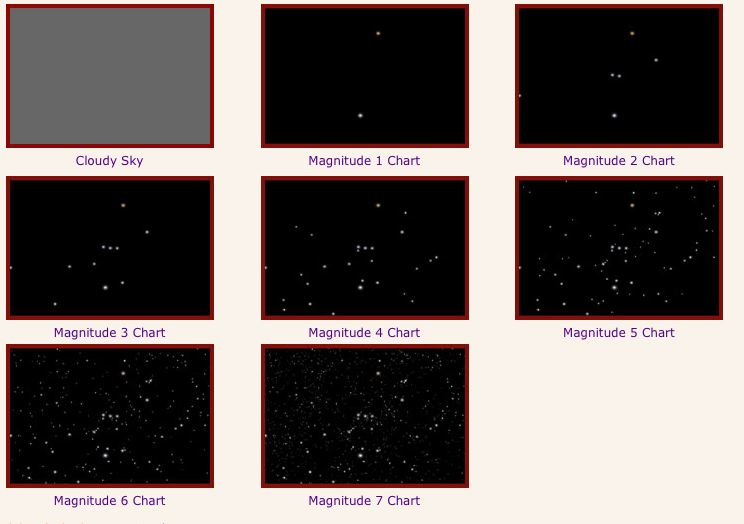GLOBE at Night (GAN), our annual dark skies campaign, is about to ramp up for 2009. GLOBE at Night will start on March 16th and culminate on March 28th in conjunction with Earth Hour.
GLOBE at Night is a citizen science campaign to raise awareness of light pollution and collect data on how bright the night sky is at various locations around the world. Anyone can participate and contribute data (and it is a good project to get students involved in, teachers!)
The procedure is simple. Go outside on a clear night from March 16th to the 28th and find the constellation Orion in the southwest. The GLOBE at Night website has magnitude charts (which I have included below...click to embiggen).
If you have a bright sky with a lot of light pollution, you might see something like the magnitude 1 or 2 chart. If you are lucky and live in a dark site, you would see the magnitude 5 or 6 chart. Simply select which chart most closely matches what you can see in the sky. That's your data. You then go to the web and report your data. The report form will be up on March 16th when the campaign starts. You will also be asked for your latitude and longitude as well as the local time. You can find your latitude and longitude using a variety of online tools or a GPS system. Once you have entered your data, you can zoom in on your city and see your data as well as data collected by others around you.
You can (and are encouraged) to take lots of observations. We need lots of measurements in suburbs, city centers, parks, the countryside, everywhere. I take some nightly bike rides during GLOBE at Night and make measurements every half mile, taking different routes each time. I have a small GPS system I use to track my runs and use an MP3 voice recorder to record my data. I can canvas dozens of square miles over the course of a few nights (I know night bike rides can be iffy in Racine this time of year!)
So why should you care about dark skies? Won't decreasing light make the night more dangerous? Well, lights pointing up = energy wasted. The least we can do is shield lights and be sure they point downward. Second, very bright lights create lots of glare to the point that too much light can decrease safety. Glare can make it difficult to see pedestrians on the street and stop signs. Wasting energy and money and decreasing safety makes no sense.
Poor lighting effects wildlife in many ways. It can disrupt mating patterns of certain animals, disorient birds, and we know they can attract insects! Research is well underway on the effects of excess nighttime lighting on human health including studies indicating increased cancer risks.
Fortunately, this is a problem that can be solved and save money at the same time. Lighting companies make lots of high quality, well shielded lights that cost no more than poorly designed fixtures. Racine's Ruud Lighting is one of these companies. They are members of the International Dark Sky Association and have many well designed lights. Many cities are passing lighting ordinances and will be installing shielded street lights as their old ones wear out. The International Dark Sky Association has sample lighting ordinances and lots of information on good lighting design.
The first steps are raising awareness and collecting data. So please take a few minutes the next couple of weeks and contribute a little piece to this ongoing project!
Reprinted with permission from the Half-Astrophysicist Blog.


Hale, you make me feel so guilty for not going out at night and looking at the sky, but it's still freezing cold here and I don't feel safe in my hood at night.
ReplyDeleteDon't feel bad Orbs, we have a nice telescope that would give us great pictures but its just too damn cold here too.
ReplyDeleteRuud just laid a bunch of employees off. From what I know, they are a great company. Too bad more are not buying their products.
ReplyDeleteI have lots going on, if I remember, I will participate. Thanks, once again, for the (literal) heads up.